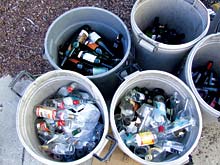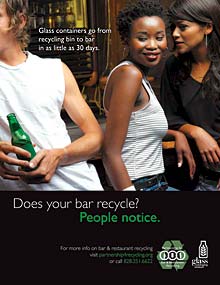A new state recycling law has local bar, restaurant and club owners concerned about how they can comply, what it will cost—and what might happen if they don’t. The law, which takes effect Jan. 1, requires all businesses licensed to sell alcohol to recycle the bottles, cans or other containers used to serve it.

When the General Assembly passed the measure in 2005, it was heralded as a way to keep tons of material out of North Carolina landfills. But as the zero hour approaches, some restaurants, particularly those downtown, are unsure how to implement a recycling plan and worried about the potential consequences if they don’t have one in place by New Year’s Day.
Each business’ specific situation is different. Some have room to store recyclables; others don’t. Some sell only small amounts of alcohol, while others go through bins and bins of bottles every night. There’s also the question of cost—an issue not lost on restaurateurs watching the bottom line.
“It’s just not pro-small business,” says Dustin Vanderbunt, co-owner of Ed Boudreaux’s Bayou Bar-B-Que. “I really don’t see how we’re going to do this.”
Vanderbunt says he’s not opposed to recycling, but his storage space is limited. He already stores trash in a space shared with Barley’s Taproom next door, but that can’t accommodate the volume of bottles and cans his restaurant goes through nightly. Vanderbunt also expresses disappointment that the city hasn’t stepped up to provide a collection system for what he says amounts to an unfunded mandate for private businesses.
Other restaurant owners echo those sentiments. They also worry about what steps the Alcoholic Beverage Control Commission might take to enforce the new law. The commission—which issues the permits that allow businesses to sell beer, wine and liquor—can impose fines or even revoke those licenses when bars or restaurants are found guilty of violating certain laws.
The situation sparked enough of an outcry that, earlier this year, the General Assembly rewrote the recycling law, specifying that businesses failing to comply won’t have their permits revoked. But according to a Sept. 21 letter from the ABC Commission to current permit holders, a violation could result in both a fine and “the suspension of all ABC permits.”

Suspensions are temporary, whereas revocations are permanent, explains LoRita Pinnix, the commission’s assistant counsel. Businesses, she notes, will also have to show that they have a recycling program in place in order to renew their permits.
Pinnix emphasizes, however, that the ABC Commission doesn’t plan an immediate crackdown on noncompliant bars. “Believe me, the commission can fine people,” she says. But initially, “the focus is going to be on education.” That could last anywhere from several months to a year, according to Pinnix.
Business owners who can’t set up a recycling program can also apply for a one-year grace period, she notes. But Pinnix adds, “From talking to the folks at the Department of Natural Resources, they feel like recycling is pretty available in the state.”
Still, even those restaurateurs who already recycle emphasize the logistical challenges. Hector Diaz has been recycling at his first Asheville restaurant, Salsa, since it opened in the mid-1990s. His other two businesses, Chorizo and Modesto, are both in the Grove Arcade, which he says is equipped to store its tenants’ recyclables. But Diaz says he’s disappointed that the city hasn’t done more to help downtown restaurants, and he feels for new businesses trying to work out a plan.
“How are you going to help me?” he wonders. “Give us a place where at least we could use a pickup truck to take [recyclables].” In the meantime, Diaz says he plans to put a shed in the alley next to Salsa, where he can store recyclables—and perhaps offer space to other Pack Square restaurants.
Reduce, reuse, remind
Even the law’s proponents admit that recycling can be complicated in places without a citywide standard practice. (Although the city contracts with Curbside Management to provide citywide recycling service, the once-a-week pickups can’t begin to handle the kind of volume some downtown restaurants and bars produce.)
“It’s tricky, but there’s a way,” insists Holly Bullman of the Land-of-Sky Regional Council, who’s been coordinating an effort to disseminate information about the new law.
Although groups such as the Asheville Independent Restaurant Association and the N.C. Restaurant and Lodging Association have been trying to educate their members about the law, rumors and uncertainty still abound, says Bullman. To address that, she’s been working to build a network to help affected businesses find information and solutions, running ads in local publications and distributing other promotional materials. The campaign’s centerpiece, however, is a Web site, www.partnership4recycling.org. Launched Oct. 12, it connects business owners with local service providers such as Curbside Management.
“There’s a gap between the law and what it requires and the people who it affects,” Bullman explains. “What we’re doing is bridging that gap.”
In the absence of citywide recycling, she argues, businesses can still create customized programs. As an example, Bullman cites several downtown restaurants that have teamed up to address the situation. The Early Girl Eatery, says co-owner Julie Stehling, shares recycling space and pickup costs with three other nearby businesses: the Tupelo Honey Café, the Laughing Seed Café and Jack of the Wood. “I think it’s good to make people recycle,” she says. “It’s crazy all the bottles and cans that go in the garbage.” Some restaurants, notes Bullman, may have to schedule several pickups a week to keep up with the volume of recyclables.
Dwight Butner, who owns Vincenzo’s Ristorante & Bistro, says it’s up to individual businesses to get creative. Some in Asheville’s restaurant community have banded together to explore the possibility of a new collection company that would focus on downtown. “We are approaching it in an entrepreneurial method,” says Butner. “We don’t have very good recycling in the area.”
And while Butner says he’s not crazy about the way the state handled the issue, he concedes that it can’t just be ignored, noting, “Restaurants produce a lot of recyclable waste.”
Land-of-Sky, meanwhile, is also issuing stickers restaurants can post in their windows to cast the recycling program in a positive light. “We want to make it a good thing instead of just something required by the law,” she says.



Before you comment
The comments section is here to provide a platform for civil dialogue on the issues we face together as a local community. Xpress is committed to offering this platform for all voices, but when the tone of the discussion gets nasty or strays off topic, we believe many people choose not to participate. Xpress editors are determined to moderate comments to ensure a constructive interchange is maintained. All comments judged not to be in keeping with the spirit of civil discourse will be removed and repeat violators will be banned. See here for our terms of service. Thank you for being part of this effort to promote respectful discussion.